Contents
- Message from DCB Leadership
- Carl Gans Award: Talia Yuki Moore
- Best Student Presentation Award
- Symposia at SICB 2023
- Student and Postdoctoral Affairs Committee Representative
- DCB on Social Media
- Members Meeting Minutes and Elections
- Virtual Workshops: “Integrative Organismal Modeling of Movement”
- Summer Opportunity: Interdisciplinary Symposium
- Candidates for DCB Chair-Elect
Message from DCB Leadership
Through January 2023, your DCB officers are:
- Chair: John Long, dcb@sicb.org
- Chair-elect: Brooke Flammang
- Program Officer: Jimmy Liao, dcb@sicb.org
- Secretary: Laura Habegger, dcb@sicb.org
- Student and Postdoctoral Representative: Armita Manafzadeh, armita@brown.edu
With this year’s annual meeting in hybrid format, the work of the Division of Comparative Biology was conducted in Phoenix by a subset of the DCB officers, Chair-elect Brook Flammang and out-going Program Officer Matt McHenry. In addition, members of the Best Student Paper Committee, mentioned below, did their work in person. On behalf of the Society and the Division, thanks to you all for your important service in running the meeting. Also, many of us decided to stay home and participate remotely, and we want to recognize the important participation of those members also – in preparations prior to the meeting, in activities during the meeting, and at SICB+ after the meeting.
Carl Gans Award: Talia Yuki Moore
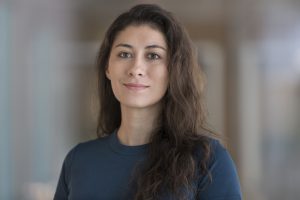
At the annual meeting in Phoenix, the winner of the 2022 Carl Gans Award, Dr. Talia Yuki Moore from the University of Michigan, presented her talk, “Embracing Change: Integrative Approaches for Biomechanics, Evolution and Ecology of Non-steady-state Motion.” We were treated to a fascinating tour-de-force that began with the early history of movement studies in animals and connected us to Dr. Moore’s work on the biomechanics and evolution of jerboas.
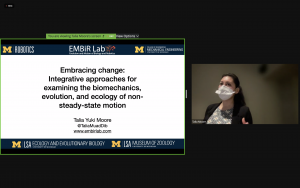
The Gans Award was sponsored this year by The Journal of Experimental Biology, published by the Company of Biologists. Dr. Monica Daley, Monitoring Editor of the journal, presented Dr. Moore with a year’s subscription. From the Society’s Gans Endowment, Dr. Moore also received financial support to help offset travel and housing expenses associated with the annual meeting.
The Gans Award Committee was composed of Drs. Monica Daley (chair), Anable Maia, Sharlene Santana, Nick Burnett, and Bill Ryerson. This year, the Committee wished to recognize the Gans Award runner-up, Dr. Alejandro Rico-Guevara, from the University of Washington. Congratulations to both Dr. Moore and Dr. Rico-Guevara.
The Carl Gans Award was established to recognize Carl Gans’ contributions to animal morphology, biomechanics, and functional biology and to honor investigators who work in this field. The Gans Award is given to (1) an outstanding young investigator in the field of comparative biomechanics and/or (2) an investigator at any career stage for a significant contribution to the literature of comparative biomechanics published in the preceding five calendar years. Each summer we solicit nominations, so please consider nominating yourself or other outstanding researchers in the field.
Best Student Presentation Award

The DCB Best Student Presentation award series featured eight outstanding finalists selected to present their work in the special session. We appreciate all of the students who submitted their application for consideration. We are grateful to the DCB BSP judging committee, which was composed of Drs. Diego Sustaita, Ashley Stoehr, and Chris Clark.
This year’s winner of The Mimi A. R. Koehl and Stephen A. Wainwright Award for the Best Student Talk in Biomechanics was Jacob Harrison, from Duke University, whose talk was titled, “Starting to Snap: the Development and Kinematics of Spring-driven Strikes in Juvenile Snapping Shrimp.”
Symposia at SICB 2023
For SICB 2023, we have a great lineup of diverse and interesting symposia:
- “Biology at Birth: the Role of Infancy in Providing the Foundation for Lifetime Success.” Organizers: Christopher Mayerl and Rebecca German
- “ The Role of Mechanosensation in Robust Locomotion.” Organizers: Katie Stanchak and Hilary Katz
- “Micro-scale Life, Large-scale Influencers: Functional Consequences of Small-scale Biophysical Processes.” Organizers: Jeanette Wheeler and Karen Chan
- “Visions for a Diverse, Inclusive & Safe Future for Field Biology.” Organizers: Vanessa K Hilliard Young, Robin Verble and Corinne L. Richards Zawacki
Have a great idea for a symposium that you would like to see at SICB? Give in to the temptation of submitting! The Society and Division encourage new and exciting symposium proposals and are happy to offer feedback on emerging ideas. The SICB website also provides guidelines for what’s involved when organizing a symposium.
Once SICB members have submitted their symposium ideas, the DCB Program Officer, Jimmy Liao, will be involved with deciding which ones to approve and grant DCB support. Please help guide us through this process by taking about one minute to fill out this survey, which indicates the kind of symposium that you would like to attend or organize yourself.
Please feel free to reach out to the divisional Program Officer, Jimmy Liao, at dpo.dcb@sicb.org with your ideas or questions.
Student and Postdoctoral Affairs Committee Representative
Hello, graduate students and postdoctoral members of DCB! We are seeking individuals interested in serving as the DCB representative on the Student and Postdoctoral Affairs Committee (SPDAC) from January 2023 to January 2026. Feel free to contact our chair John Long (chair.dcb@sicb.org) or our current DCB SPDAC representative Armita Manafzadeh (armita@brown.edu or Twitter: @armanafzadeh or @SICB_DCB_DVM) with any questions.
If you are interested in becoming the next SPDAC rep, please read the information below, which includes instructions for indicating your interest.
Eligibility Requirements
- Current graduate student or postdoctoral SICB member affiliated with the Division of Comparative Biomechanics.
- Expects to remain a graduate student and/or postdoctoral scholar for the entire term duration (post-SICB meeting January 2023 through SICB meeting in January 2026).
Responsibilities
- Attend the 2024, 2025, and 2026 SICB annual meetings, and, while there, attend the DCB members’ meeting, and all SPDAC meetings and SPDAC events.
- Attend DCB and SPDAC virtual meetings throughout the year.
- Serve as a liaison between DCB students and SICB officers.
- Assist with SPDAC activities (e.g., annual workshop, annual meeting booth, and content creation) as assigned by SICB’s SPDAC chair (currently: Jason Macrander).
- Moderate the DCB Facebook account and co-run DCB/DVM Twitter account with the DVM SPDAC rep, with help from other officers.
- Pass on questions/concerns from DCB student/postdoc members to DCB officers.
Process for Indicating Interest
In addition to a curriculum vitae, please send a cover letter to the DCB Chair, John Long, chair.dcb@sicb.org, in which you provide the following information:
- Eligibility Requirement: Are you currently, and do you expect to remain, a graduate student or postdoc member of SICB through January 2026? Please note that you must currently expect to be a graduate student or postdoc for the entire three-year term (January 2023-January 2026) to be eligible for consideration (though we understand that changes in plans may arise).
- What pronouns do you use? (OPTIONAL.)
- What is your current year, position, and institution? (e.g., 4th year PhD candidate at Anita College, 1st year postdoc at Joe University.)
- How many years have you been a SICB member? How many years have you been a DCB member?
- Have you engaged in any SICB service previously? Please briefly specify. (e.g., Code of Conduct ally, SPDAC workshop expert, session chair, Charlotte Mangum volunteer, symposium organizer, IOB blogger)
- Have you engaged in any other institutional or professional service previously? Please briefly describe.
- Do you identify with a group underrepresented along any axis of diversity in SICB? If you would like to share, please briefly describe. This question is for applicant pool record-keeping purposes only and will not influence selection outcome. (OPTIONAL.)
- How would holding this position benefit your career and/or professional plans? (200 words or less.)
Materials are due by 30 June 2022.
Evaluation Criteria
Applicants will be evaluated by the current DCB officers and the SPDAC representative based on their responses to the questions. We seek potential representatives who have a strong desire for this position, communicate carefully and concisely, and are enthused about SICB, DCB, and the shared enterprise of our Society. As required by SICB bylaws, DCB officers will provide a list of candidates to the Society’s President, who will select and appoint the new SPDAC representative.
DCB on Social Media
If you’re on social media, make sure you’re a member of our Facebook group and follow our Twitter account (@SICB_DCB_DVM). Please tag @SICB_DCB_DVM in any tweets you’d like us to signal boost to our community, and feel free to ask science and/or logistical questions you might have in our Facebook group.
Members Meeting Minutes and Elections
The minutes from our latest members meeting in January 2022 can be found on our divisional website.
This is an important time for DCB as we will be selecting a new Chair-Elect, whose term begins in January 2023. This task is overseen by our 2022 Election Nominating Committee: Lara Ferry, Lisa Whitenack, and Matt Kolmann. Thank you so much to the committee for their help seeking nominees for this important election, we also want to thank Manny Azizi for assisting the committee. Finally, we want to express our gratitude to all candidates for supporting DCB; your time and commitment is an invaluable contribution to our division. You will find all candidates’ biographies at the end of this newsletter. Please don’t forget to vote: your input contributes to the growth of our division.
Virtual Workshops: “Integrative Organismal Modeling of Movement”
This series of workshops is led by a diverse team of experts in the field that will provide insight on how to apply mathematical analysis and modeling approaches to experimental datasets on moving organisms. More information is available at the workshop website.
Summer Opportunity: Interdisciplinary Symposium
This symposium is titled “Fast Movements, Impacts and Deformation: Nature, Robotics and Materials,” with the goal to build an interdisciplinary community to investigate the material, mechanics, and control of fast movement in biology and engineering. The symposium will occur July 19-21, 2022, at The Washington Duke Inn in Durham, NC USA. More information is available at the symposium website.
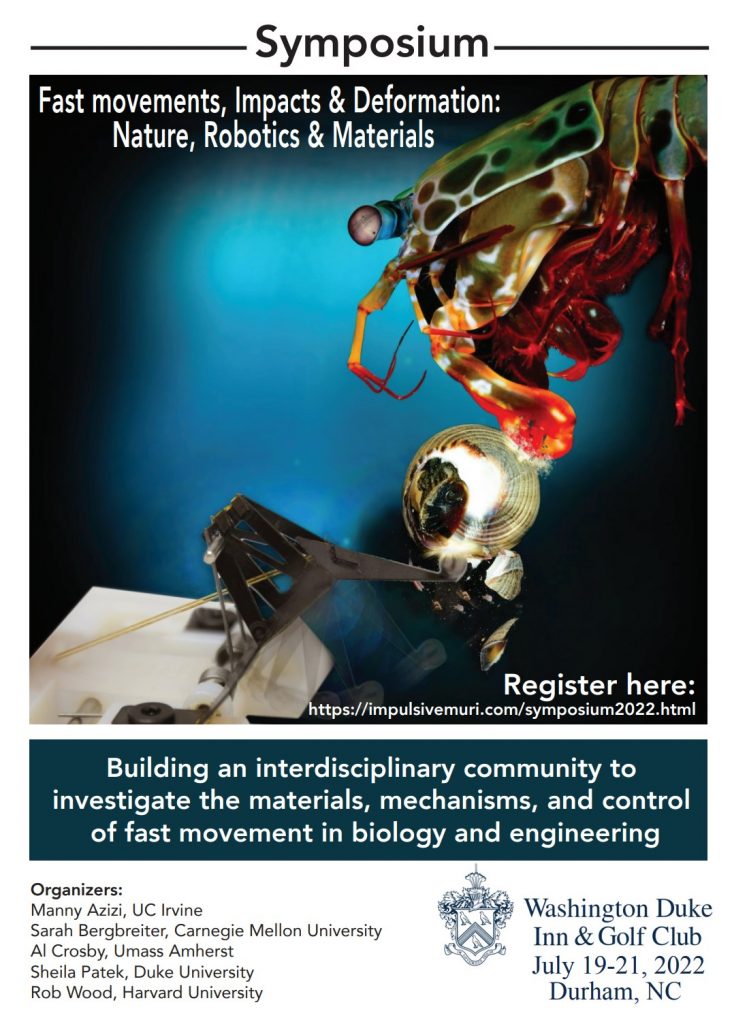
Candidates for DCB Chair-Elect
Misty Paig-Tran
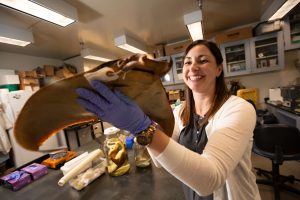
Current Position: Associate Professor of Biological Science
Education: Postdoctoral Scholar (Arizona State University); Ph.D. Biology (University of Washington); B.S. Marine Biology (California State University); A.A. Liberal Arts (Golden West College)
Professional Experience: Microplastic Sampling and Detection Workshop Co-Organizer; CSU COAST Funded; ASIH Raney Fund Committee (2021 Chair), Joint Meeting of Ichthyologists and Herpetologists Diversity and Equity Representative for AES; 2015 Symposia organizer: Integrative Elasmobranch Biology; AES; Equity and Diversity Committee, AES; Board of Directors, AES; Nominating Committee, AES
SICB Activities: Student Awards Competition Judge (DCB; DVM); SICB Public Affairs Committee, Division of Vertebrate Morphology nominating committee; Southwest Organismal Biology Regional Meeting Co-Organizer; Academic Transitions: Successfully Navigating from Undergraduate to Professor; Student Award Committee, SICB
Other Memberships: American Elasmobranch Society(AES); American Society for Ichthyologists and Herpetologists (ASIH); Sigma Xi; American Microscopical Society(AMS); Southern California Academy of Sciences (SCAS)
Research Interests: My lab (CSUF FABB Lab) explores performance in mostly marine organisms. The lab operates at the interface of biology and materials science. The majority of our work is focused within the marine realm, using biomechanics to explore a wide-range of topics though most of this work is concentrated in two areas: filtration in large scale animals (whale sharks, manta rays, baleen whales), biological armors (armored catfishes, armadillos). Additional topics currently happening in the lab include bite force in squids, hearing mechanics of baleen whales, microplastic pollution in commercially important fishes, and reproduction in chimeras.
Statement of Goals: The field of Comparative Biomechanics is growing and with this growth comes new opportunities and challenges. It is my great honor to be nominated for the DCB Chair-elect position. SICB is my home society, and I am proud to call myself a member of the Division of Comparative Biomechanics. DCB has provided me with stimulating scientific conversations, lifelong friends, collaborations, and mentors who have supported my journey as a scientist throughout my scientific career. And now I aim to pay this forward as a member of our distinguished leadership. Previously I have served on the PAC committee and as a judge for the Koehl and Wainwright Best Student Talk Award. As Chair-Elect I will work to ensure that our society continues to support equitable practices, programming, and policies across a broad spectrum of inclusivity. I have served as a founding member of DEI committees in other societies (JMIH and AES) helping to draft and implement Codes of Conduct. Additionally, I have been formally trained at my home university on best practices for implementing equitable policies. I am proud of the steps SICB has taken to create a more equitable, inclusive, and welcoming society for scientists from many walks of life and I look forward to building onto the wonderful work already implemented by my predecessors. I believe that much of our strength comes from the seamless integration between our students and professional members. It is my goal to prioritize support and recognition for our early-career members (through recognition awards and best student talks and poster competitions, and through prioritizing travel support) as well as to create networking and collaborative opportunities for our members at all career stages. I believe that work coming out of DCB is some of the most innovative and integrative at SICB and I look forward to working together with the DCB membership and leadership team.
Stephanie Pierce
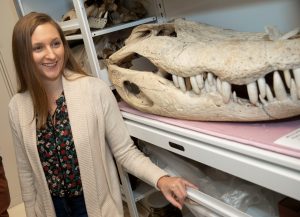
Current Position: Professor of Organismic and Evolutionary Biology and Curator of Vertebrate Paleontology, Museum of Comparative Zoology, Harvard University.
Education: PhD in Palaeobiology (University of Bristol); MSc in Systematics and Evolution (University of Alberta); BSc Major in Palaeontology (University of Alberta).
Professional Experience: Postdoctoral Researcher at the University of Cambridge and the Royal Veterinary College; Lecturer at the Royal Veterinary College; Assistant Professor, Thomas D. Cabot Associate Professor, and Professor at Harvard University; Curator of Vertebrate Paleontology at the Museum of Comparative Zoology, Harvard University.
SICB Activities: Member and attendee since 2013; Symposium participant; Regular attendee at the Northeast Regional SICB meeting (DCB,DVM).
Other Memberships: International Society of Vertebrate Morphologists (Executive and Nomination Committee); Society of Vertebrate Paleontology; American Association of Anatomists; Society for the Study of Evolution.
Research Interests: My research team investigates large-scale transformations of the musculoskeletal system and their impact on the function and ecology of terrestrial vertebrates. Specifically, our work integrates three-dimensional computational modeling techniques with biomechanical experimentation and multivariate statistical methods to reanimate the remains of long extinct animals at critical points in the geological past. While our works spans many aspects of the vertebrate fossil record, we are particularly interested in two key evolutionary events that profoundly shaped the vertebrate tree of life: the transition from water-to-land in early tetrapods and the transition from “reptiles”-to-mammals in the synapsid lineage.
Statement of Goals: I have recently gone through the tenure process and recognize – more than ever – the importance of a supportive community to attaining academic success. SICB is one of the most supportive communities I have been part of and stands out in its effort to make the field of comparative biology inclusive and accessible to all. Its focus on early career development is one of its greatest strengths, with extensive student-centered funding, workshops, and networking opportunities. I am excited to serve as DCB-Chair-Elect and continue the tradition of supporting and promoting early career scientists from all backgrounds so we can build the strongest community moving forward. However, I am also passionate about extending this support to all career stages to ensure long-term success and to stop the “leaky pipeline” – especially considering the impacts of the pandemic. As DCB-Chair-Elect I will also continue to foster an inclusive and diverse community, building off recent efforts to provide DEIJ events and parent-specific resources, as well as recent moves to reduce barriers to participation through low-cost hybrid options.
